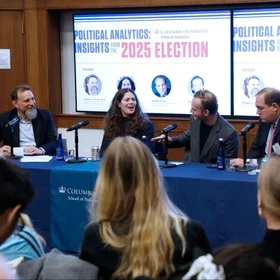A recognized expert in human capital analytics, Dr. Solange Charas joined Columbia’s Master of Science in Human Capital Management program as a Lecturer in 2019. Dr. Charas holds 30+ years of experience as a consultant, practice leader, top corporate executive, and board director across all industry sectors. She acted as the Chief Human Resources Officer at Havas Worldwide, Benfield Group, and Praetorian Financial Services Group, and held senior-level positions at Ernst & Young, Arthur Andersen and Towers Watson. Dr. Charas is a Distinguished Principal Research Fellow with The Conference Board, and currently working on two research projects in that role. She is the Founder and CEO of HCMoneyball.
Dr. Charas believes that this is a game-changing time for Human Capital professionals as the practitioner community is beginning to adopt what academic researchers have established over the last 50 years—that human capital performance is quantifiable and is a significant driver of economic value creation for organizations. She dedicates herself to three major areas of activity: teaching the next generation of human capital professionals; engaging in primary research and thought-leadership; and managing HCMoneyball, which has a product that supports the use of human capital analytics.
Dr. Charas brings her research findings to her students—creating conversations about how new developments can apply to their current work. In fact, the challenge of creating “curricula that reflects the world today and resonates with adult-learners” drew Dr. Charas to joining Columbia’s Master of Science in Human Capital Management program as a Lecturer. She believes that Columbia’s HCM program, “is critical to creating the HR leaders of the future.”
As a researcher, Dr. Charas is engaged in two research projects. The first research project focuses on “Human Capital Management as an ESG Issue.” She shares, “Over the course of 15 months, The Conference Board conducted five all-day sessions with more than 100 participants representing governance, legal, HR, investors, government officials, etc. to explore and discuss the role of Human Capital Management as a governance issue.” Dr. Charas and others on the team summarized and presented the reporting requirements of eight ESG monitoring agencies—including GRI, IIRC, SASB, ISO, WEF, and more—to contextualize how the governance monitoring and investor communities are evaluating HCM performance and impact, on governance and corporate financial outcomes.
A natural development, Dr. Charas notes, “is that in the fall of 2020, the SEC modernized their reporting requirement to include HCM disclosure, confirming that Human Capital performance information is critical to investors. In addition to having a material impact on financial performance, the SEC now recognizes that human capital is an intangible asset and not simply an ‘expense’. Ocean Tomo, a Management and Advisory services firm centered on intellectual property assets, recently updated their market research estimating that the vast majority (90%) of S&P 500 market value is made up of intangible assets—since HC is an intangible asset, this will have a profound impact on how companies think about HC.” She remarks that, “one of the most important skills that human capital professionals need to develop is financial literacy as what they will be asked to do is determine the extent to which human capital policy, programs and outcomes are material, and manage programs to optimize the return on investment in human capital initiatives.”
The importance of HC as an intangible asset is also crucial in Dr. Charas’ second research project: “Human Capital analytics used to impact the employee experience.” In October 2020, Dr. Charas and a team of researchers surveyed The Conference Board members to understand how Human Capital Analytics informed their policy and program choices to enhance the employee experience. She says, “Stela Lupushor and I analyzed the results of the survey and found three interesting quantitative findings. First, investments in human capital programs are positively correlated to employee productivity (with productivity being a driver of profitability). Second, we saw a strong negative correlation between net debt and employee productivity. We believe (although not yet proven) that companies that have a lot of debt do not invest in HC programs, which is logical as free cash flow is probably being used to service that debt, rather than invest in human capital programs. And third, we learned that organizations that have dedicated human capital analytics functions with at least five human capital analysts are financially out-performing organizations not actively using data analytics. We believe this enhanced financial performance is due in part to using HC performance information to optimize their HC policy and program outcomes which are ultimately accretive to the bottom line.”
Lastly, Dr. Charas created a SaaS-based software solution to allow subscribers to automatically generate human capital analytics using algorithms accepted by academic and regulatory communities, so that the relationship between human capital performance and corporate performance can be easily tracked and benchmarked, and insights gained about the materiality of human capital. “This product is a fast and efficient way to replace the work of data analysts without having to hire dedicated staff and still get the benefits we see in those organizations with a staff of analysts.”
Financial impact is key to Human Capital Management’s business impact and Dr. Charas brings this message to her Columbia University students in a variety of ways, as they build their own “financial muscle” and grow.
Learn more about the M.S. in Human Capital Management.


